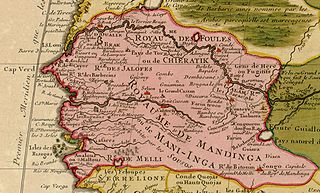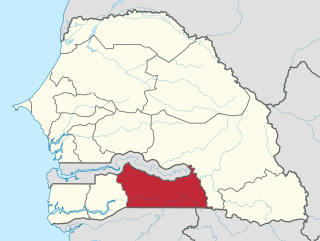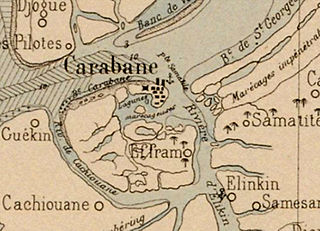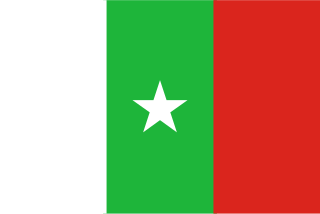
The history of Senegal is commonly divided into a number of periods, encompassing the prehistoric era, the precolonial period, colonialism, and the contemporary era.

Senegambia, officially the Senegambia Confederation, was a loose confederation in the late 20th century between the West African countries of Senegal and its neighbour The Gambia, which is almost completely surrounded by Senegal. The confederation was founded on 1 February 1982 following an agreement between the two countries signed on 12 December 1981. It was intended to promote cooperation between the two countries, but was dissolved by Senegal on 30 September 1989 after The Gambia refused to move closer toward union. The Senegambia Confederation should not be confused with the historic Senegambia region, also shortened to Senegambia.

Ziguinchor is a region of Senegal. The region is also referred to historically and popularly as Basse Casamance.

The Casamance conflict is an ongoing low-level conflict that has been waged between the Government of Senegal and the Movement of Democratic Forces of Casamance (MFDC) since 1982. On May 1, 2014 the leader of the MFDC sued for peace and declared a unilateral ceasefire.

Kolda is a region of Senegal. The region is also referred to historically and popularly as Haute Casamance.
Guinea-Bissau Creole is a Portuguese-based creole language spoken in Guinea Bissau, Senegal and The Gambia. It is also called by its native speakers as guinensi, kriyol, or portuguis.
The Jola are an ethnic group found in Senegal, the Gambia, and Guinea-Bissau. The word 'Jola' is however the Mandinka name for this ethnic group and means 'payback', since Jolas are renowned for doing back what's been done to them, be it a good or a bad deed. The name of the Jola tribe in their own language and tradition is Ajamat. So in their language, they are the Ajamat or Ajamataw people. There are large numbers of these people on the Atlantic coast between the southern banks of the Gambia River, the Casamance region of Senegal and the northern part of Guinea-Bissau. In the 1440s the Jolas were engaged in palm wine tapping in Bathurst. By the end of the 11th century some Jola had moved to producing groundnuts as a cash crop and, much later, during the Second World War had expanded greatly. They also reared livestock and produced other crops including sweet potatoes, yams and watermelon. Distinct from elsewhere in Africa, this tribe is the only one of its kind with its tradition and culture - the Jola live in their kingdom with their king, the Marabout and the elders, within Gambia and the highlands of Gambia, the Casamance region of Senegal, and northern Guinea-Bissau.
Casa Sports de Ziguinchor is a Senegalese football club based in Ziguinchor. They play in the top division in Senegalese football. Their home stadium is Stade Aline Sitoe Diatta. It is the most popular sports club in Casamance, the first four letters of the area gives the name to the club, the short form Casa.
Father Augustin Diamacoune Senghor was a Roman Catholic priest and a leading figure in the Casamance independence movement from Senegal. He served as director of the Saint-Louis of Ziguinchor Seminary from 1972 until 1975.

Carabane, also known as Karabane, is an island and a village located in the extreme south-west of Senegal, in the mouth of the Casamance River. This relatively recent geological formation consists of a shoal and alluvium to which soil is added by accumulation in the branches and roots of the mangrove trees which cover most of the island. Along with the rest of Ziguinchor Region, Carabane has a tropical climate, cycling between a dry season and a wet season. The island was once considered an arid location where no useful plants were likely to grow, but it now supports several types of fruit tree, the most common of which are mangos and oranges. Although the nearby Basse Casamance National Park and Kalissaye Avifaunal Reserve have been closed for years because of the Casamance Conflict, Carabane has continued to attract ornithologists interested in its wide variety of birds. Various species of fish are plentiful around the island, but there are very few mammals.

Seleki is a village in Basse Casamance in the south of Senegal. The presence of cases à impluvium, typical of Jola architecture, greatly contribute to the reputation of the village.

The Movement of Democratic Forces of Casamance is the main separatist movement in the Casamance region of Senegal, founded in 1982. It was supported by Guinea-Bissau President João Bernardo Vieira until he was overthrown in 1999. It relies mainly on the Jola people. Its armed wing was formed in 1985 and is called Atika.
Cannabis in Senegal is illegal; the drug is locally referred to as yamba.
This article is a list of events in the year 2004 in Senegal.
Senegal's environmental issues are varied. According to the CIA world factbook pressing problems exist with: diminishing wildlife populations which are threatened by poaching, deforestation, overgrazing, soil erosion, desertification, and overfishing.
The Museum of Black Civilisations is a museum in Dakar, Senegal. Opened in December 2018 it is the realisation of Léopold Sédar Senghor, Senegal's first President, vision to create a museum that would represent the histories and contemporary cultures of Black people everywhere.













